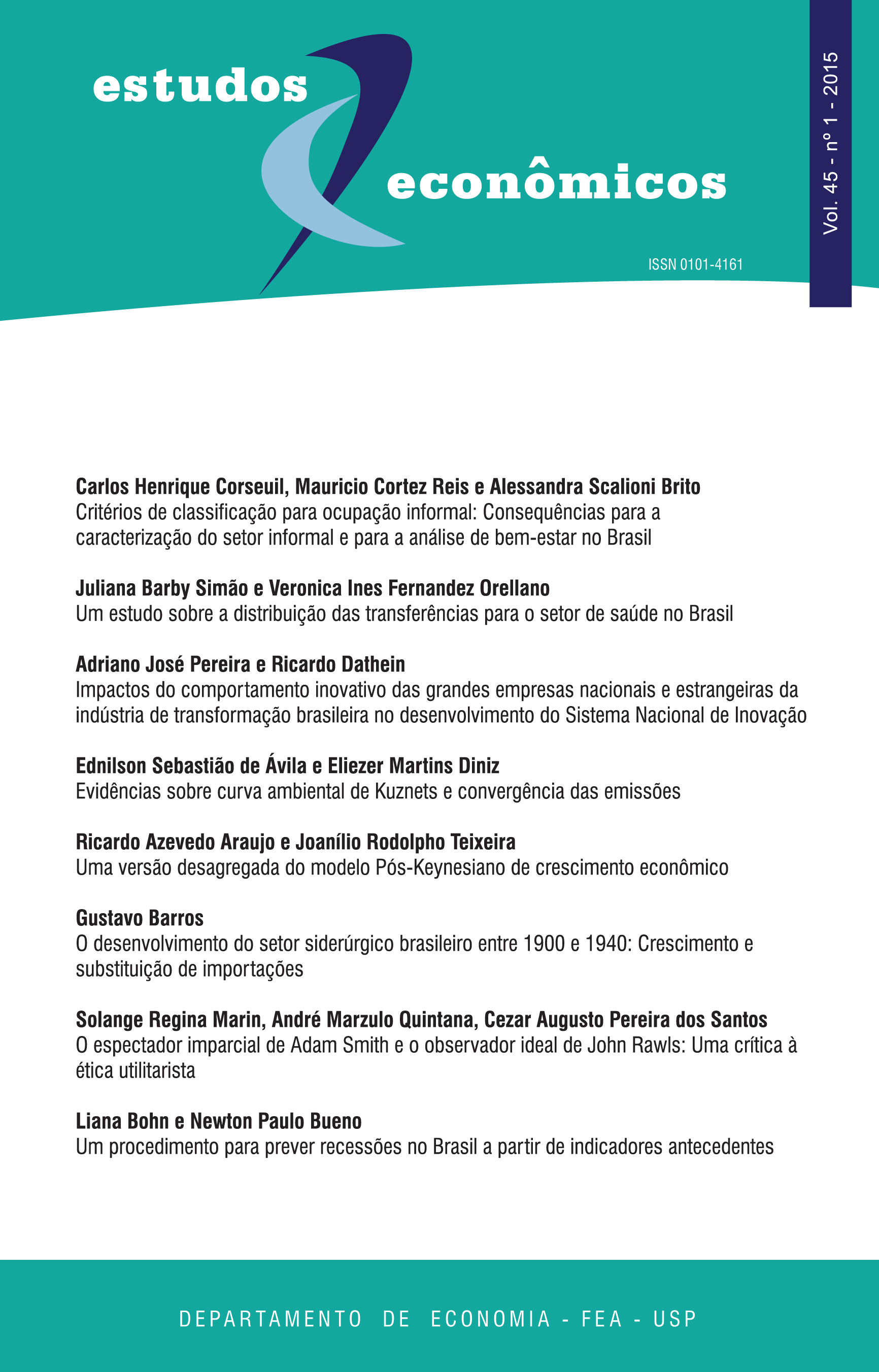O espectador imparcial de Adam Smith e o observador ideal de John Rawls: uma crítica à ética utilitarista
DOI:
https://doi.org/10.1590/0101-4161201545185sacPalavras-chave:
Adam Smith, John Rawls, espectador imparcial, observador idealResumo
John Rawls fundamenta o utilitarismo na concepção de observador ideal presente nas teorias dos sentimentalistas escoceses do século XVIII, particularmente nas teorias de David Hume e Adam Smith. Como a tese do utilitarismo não é tão explícita e acessível na ótica de ambos os filósofos escoceses, pretendemos, no presente trabalho, confrontar a tese do espectador imparcial de Smith e a crítica de Rawls à concepção do observador ideal como fundadora do utilitarismo. Observamos maior abrangência para o espectador imparcial em relação ao observador ideal utilitarista nas escolhas morais.
Downloads
Referências
BIANCHI, A. M. A Pré-História da Economia: De Maquiavel a Smith. São Paulo: Hucitec, 1988.
BENTHAM, J. [1823] An introduction to the principles of morals and legislation. 2. ed. Londres:
Prometheus Books, 1988.
BIRCH, T. D. “An analysis of Adam Smith’s theory of charity and the problems of the poor”. Eastern Economic Journal, Bloomsburg, 24 (1): 25-41, 1998.
CERQUEIRA, H E. A. da G. “Sobre a Filosofia Moral de Adam Smith”. XXXIV Encontro Nacional de Economia. Disponível: http://ideas.repec.org/e/pce10.html, Acesso: 01/02/2007, 2006.
CRISP, R. “Equality, Priority, and Compassion”. Ethics, 113 (4): 745-763, 2003.
DARWALL, S. “Sympathetic liberalism: Recent work on Adam Smith”. Philosophy and Public Affairs, 28(2): 139-164, 1999.
FREY, R. G. Utilitarismo. In OUTHWHAITE, W., BOTTOMORE, T. (eds). Dicionário do pensamento social do século XX. Rio de Janeiro: Zahar, p. 785-787, 1996.
GANEM, Â. “O mercado como teoria da sociedade: a radicalidade filosófica de Adam Smith”. IV Encontro Nacional de Economia Política, UFRGS, Porto Alegre-RS. Disponível: http://www.race.nuca.ie.ufrj.br/nuca-wp/autor/ganem3.exe. Acesso: 01/ 03/2001, 1999.
HARE, R. M. Ética: problemas e propostas. São Paulo: Ed. UNESP, 1998.
HARSANYI, J. C. “Morality and the theory of rational behaviour.” In Utilitarianism and Beyond. Sen, Amartya & Williams, Bernard (ed.). Cambridge: Cambridge U.P. p. 39-62, 2002.
HARSANYI, J. C. “Cardinal Welfare, Individualistic Ethics, and Interpersonal Comparisons of Utility”. Journal of Political Economy, 63, 1955.
HEILBRONER, R. L. “The socialization of the individual in Adam Smith.” History of Political Economy, 14(3): 427-439, 1982.
HOBBES, T. Leviatã. São Paulo: Nova Cultural (Coleção: Os Pensadores), 1997.
HUME, D. Uma Investigação Sobre os Princípios da Moral. Campinas: UNICAMP, 1995.
HUME, D. Tratado da Natureza Humana: uma tentativa de introduzir o método experimental de raciocínio nos assuntos morais. Trad. Débora Danowsky, 2ª ed. São Paulo: Ed. UNESP, 2009.
KONOW, J. Is Fairness in the Eye of the Beholder? An Impartial Spectator Analysis of Justice. MPRA Paper nº 2730. Disponível: http://mpra.ub.uni-muenchen.de/2730/, 2006. Acesso: 15/11/2007.
PRIETO, J. H. El Sistema de La Simpatia de Adam Smith: uma alternativa liberal olvidada por
John Rawls. Documento CEDE 2006-17. Disponível: http://economia.uniandes.edu.co/
investigaciones_y_publicaciones/CEDE/Publicaciones/documentos_cede/2006/alternativa_liberal_olvidada_por_john_rawls, 2006. Acesso: 09/10/2007.
RAPHAEL, D. D. Adam Smith 1790: the man recalled; the philosopher revived. In Adam Smith Reviewed.
JONES, Peter; SKINNER, Andrew S. (ed.), Edinburgh: University Press, 1992.
RAWLS, J. The Sense of Justice. The Philosophical Review. 72(3): 281-305, 1963.
RAWLS, J. Some Reasons for the Maximin Criterion. The American Economic Review, 64 (2): 141-146, 1974.
RAWLS, J. Uma Teoria da Justiça. São Paulo: Martins Fontes, 1997.
RAWLS, J. Lectures on the History of the Moral Philosophy. Editado por Barbara Herman. London: Harvard, 2000.
RAWLS, J. Justiça e Democracia. São Paulo: Martins Fontes, 2002.
RAWLS, J. Justiça como Equidade: Uma Reformulação. São Paulo: Martins Fontes, 2003.
RAWLS, J. História da Filosofia Moral. São Paulo: Martins Fontes, 2005.
SEN, A. Equality of what? The Tanner Lectures on Human Values, 1979.
SEN, A. Well-Being, agency and freedom (the Dewey Lectures, 1984). The Journal of Philosophy, 82 (4): 169-221, 1985.
SEN, A. Sobre Ética e Economia. São Paulo: Schwarcz, 1999.
SEN, A. Imparcialidade Aberta e Fechada. Alceu. PUC Rio. v 3, n. 6, p. 5-30. Disponível: http://
publique.rdc.puc-rio.br/revistaalceu/cgi/cgilua.exe/sys/start.htm?tpl=home,
a. Acesso: 01/02/2007.
SEN, A. Development as Capability Expansion. In: Fukuda-Parr S, et al. Readings in Human
Development. New Delhi: Oxford University Press, 2003b.
SEN, A. “Adam Smith and the contemporary world”. Erasmus Journal for Philosophy and Economics. Vol. 3, Nº 1, p. 50-67. Disponível: http://ejpe.org/pdf/3-1-art-3.pdf, 2010. Acesso: 26/07/2010.
SUGDEN, R. Beyond Sympathy and Empathy: Adam Smith’s concept of fellow-feeling. Economics and Philosophy, 18: 63-87, 2002.
SMITH, A. Teoria dos Sentimentos Morais. São Paulo: Martins Fontes, 1999.
TUGENDATH, E. Lições sobre Ética. Petrópolis: Ed. Vozes, 2000.
Downloads
Publicado
Edição
Seção
Licença
Copyright (c) 2015 Solange Regina Marin, André Marzulo Quintana, Cezar Augusto Pereira Santos

Este trabalho está licenciado sob uma licença Creative Commons Attribution-NonCommercial 4.0 International License.
A submissão de artigo autoriza sua publicação e implica o compromisso de que o mesmo material não esteja sendo submetido a outro periódico.
A revista não paga direitos autorais aos autores dos artigos publicados.





 Atualizado em 14/08/2025
Atualizado em 14/08/2025